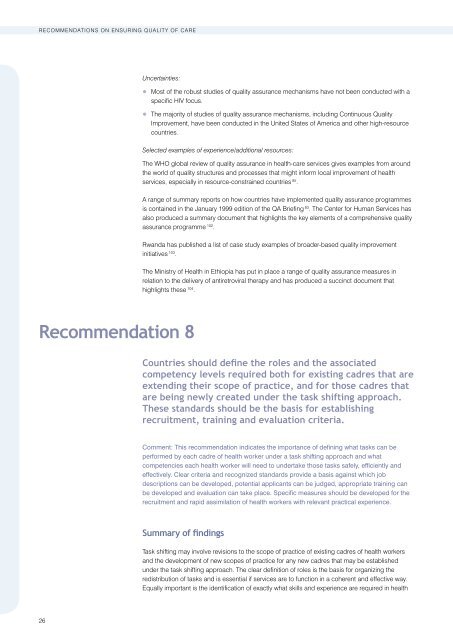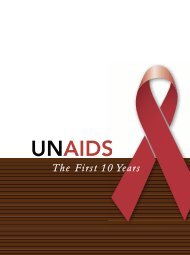Task Shifting - Global Recommendations and Guidelines - unaids
Task Shifting - Global Recommendations and Guidelines - unaids
Task Shifting - Global Recommendations and Guidelines - unaids
Create successful ePaper yourself
Turn your PDF publications into a flip-book with our unique Google optimized e-Paper software.
<strong>Recommendations</strong> on ensuring quality of care<br />
Uncertainties:<br />
• Most of the robust studies of quality assurance mechanisms have not been conducted with a<br />
specific HIV focus.<br />
• The majority of studies of quality assurance mechanisms, including Continuous Quality<br />
Improvement, have been conducted in the United States of America <strong>and</strong> other high-resource<br />
countries.<br />
Selected examples of experience/additional resources:<br />
The WHO global review of quality assurance in health-care services gives examples from around<br />
the world of quality structures <strong>and</strong> processes that might inform local improvement of health<br />
services, especially in resource-constrained countries 85 .<br />
A range of summary reports on how countries have implemented quality assurance programmes<br />
is contained in the January 1999 edition of the QA Briefing 83 . The Center for Human Services has<br />
also produced a summary document that highlights the key elements of a comprehensive quality<br />
assurance programme 102 .<br />
Rw<strong>and</strong>a has published a list of case study examples of broader-based quality improvement<br />
initiatives 103 .<br />
The Ministry of Health in Ethiopia has put in place a range of quality assurance measures in<br />
relation to the delivery of antiretroviral therapy <strong>and</strong> has produced a succinct document that<br />
highlights these 104 .<br />
Recommendation 8<br />
Countries should define the roles <strong>and</strong> the associated<br />
competency levels required both for existing cadres that are<br />
extending their scope of practice, <strong>and</strong> for those cadres that<br />
are being newly created under the task shifting approach.<br />
These st<strong>and</strong>ards should be the basis for establishing<br />
recruitment, training <strong>and</strong> evaluation criteria.<br />
Comment: This recommendation indicates the importance of defining what tasks can be<br />
performed by each cadre of health worker under a task shifting approach <strong>and</strong> what<br />
competencies each health worker will need to undertake those tasks safely, efficiently <strong>and</strong><br />
effectively. Clear criteria <strong>and</strong> recognized st<strong>and</strong>ards provide a basis against which job<br />
descriptions can be developed, potential applicants can be judged, appropriate training can<br />
be developed <strong>and</strong> evaluation can take place. Specific measures should be developed for the<br />
recruitment <strong>and</strong> rapid assimilation of health workers with relevant practical experience.<br />
Summary of findings<br />
<strong>Task</strong> shifting may involve revisions to the scope of practice of existing cadres of health workers<br />
<strong>and</strong> the development of new scopes of practice for any new cadres that may be established<br />
under the task shifting approach. The clear definition of roles is the basis for organizing the<br />
redistribution of tasks <strong>and</strong> is essential if services are to function in a coherent <strong>and</strong> effective way.<br />
Equally important is the identification of exactly what skills <strong>and</strong> experience are required in health<br />
26

















